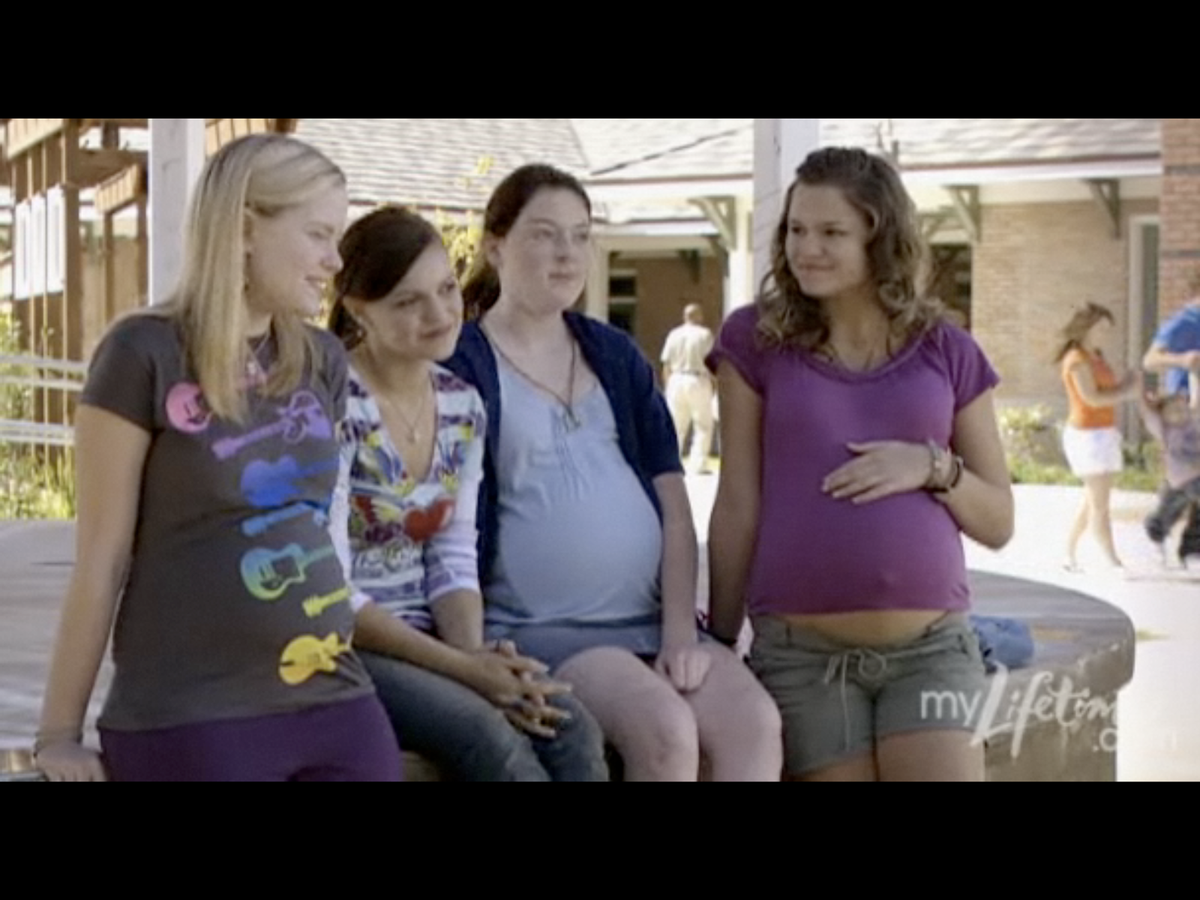On Saturday, Lifetime's "inspired by a true story" original movie, "The Pregnancy Pact," became "the most-watched basic cable film among adults 18-34 since 2002 and the highest-rated among women 18-34 since 1994," according to Variety. Among "major demos," it was the most-watched film in the network's history. And with numbers like that, who cares if the "true" story it was based on -- a supposed pact among 17 high school girls in Gloucester, MA, to get pregnant and raise their babies together -- wasn't?
In fairness to Lifetime, the movie's official description calls it the "story of a fictional 'pregnancy pact' set against the backdrop of actual news reports"; they're not claiming the pact itself was real. But the surprising popularity of the film reminds us just how much we all wanted it to be, back in June of 2008. As Ellen Goodman wrote shortly after the girls' agreement was revealed to be non-existent: "The tale of the pregnancy pact led all the usual suspects to cast all the usual blame. It was because the state rejected abstinence-only funds. No, it was because the school couldn't dispense condoms. It was because the celebrity culture bred Jamie Lynn Spears wannabes. No, it was because the town was in the economic dumps. It was because the school had day care. No, it was because of an 'absolute moral collapse.'" Teenage pregnancy is a handy, bipartisan peg for any number of pet peeves and potential moral panics, so it's hard to resist writing about such a dramatic instance of it even before you have all the facts. (I did.)
I was reminded of that this morning when I saw several bloggers mention a new Guttmacher Institute report offering "the first documentation of what experts have suspected for several years, based on trends in teens' contraceptive use -- that the overall teen pregnancy rate would increase in the mid-2000s following steep declines in the 1990s and a subsequent plateau in the early 2000s." In 2006, the most recent year for which we have data, the teen pregnancy rate rose by 3%, the first increase in more than a decade. As Salon contributor Lynn Harris said in her superhero guise:
2006: Let's plot that on a timeline of SURELY UNRELATED events in U.S. history. Aha: Turns out a long-term decline in teen pregnancy -- due in part to increased contraceptive use among teens -- flattened out and then reversed... what's this? The decline reversed at the same time that the Bush administration and Congress ramped up funding for rigid abstinence-only-until-marriage programs that are prohibited from discussing the benefits of contraception. Coincidence, or...? Yeah, gotta be coincidence.
Now, I find it entirely believable that crappy sex ed is to blame for the spike in teen pregnancy, and I'll take any opportunity to remind anyone who will listen that abstinence-only education does not work. But the fact is, yes, it could still be a coincidence at this point. Even in the Guttmacher's press release, director of domestic research Lawrence Finer notes, "It is too soon to tell whether the increase in the teen pregnancy rate between 2005 and 2006 is a short term fluctuation, a more lasting stabilization or the beginning of a significant new trend, any of which would be of great concern." And I'll lay dollars to donuts that the same people who characterized the imaginary Gloucester pact as the result of an "absolute moral collapse" -- or of high school day care centers or reckless celebrity culture (at least before Bristol Palin replaced Spears as the poster girl for young motherhood) -- are now rushing to explain the increase in teen pregnancies with theories that fit their own beliefs. Meanwhile, no one knows for sure if the 2006 numbers were anything more than a blip.
Those of us who believe that sexually active human beings of all ages deserve honest information about sex, readily available contraception and support for their reproductive choices do have the facts on our side. Abstinence only education doesn't work. Contraception makes an enormous difference. By their late teens, at least three-fourths of Americans have had sexual intercourse, whether their parents, pastors and principals are happy about it or not. And according to RH Reality Check, "The overwhelming evidence demonstrates that sex education that teaches both the benefits and limitation of birth control does not increase teen sexual activity. In fact, several curricula have shown this approach to delay early sexual involvement and increase use of birth control among already sexually active teens." There's plenty of evidence to support a push for comprehensive sex education and making contraception as widely available as possible -- and indeed to support they hypothesis that the increase in abstinence-only sex ed is responsible for an increase in teen pregnancies, especially given the plateau preceding it. Despite his note of caution, Finer adds,"Either way, it is clearly time to redouble our efforts to make sure our young people have the information, interpersonal skills and health services they need to prevent unwanted pregnancies and to become sexually healthy adults." It's always time for that. But until a clear pattern has been established over longer than one year, the most we can honestly say about claims that Bush administration policies led directly to a spike in teen pregnancies is that they're inspired by a true story.



Shares